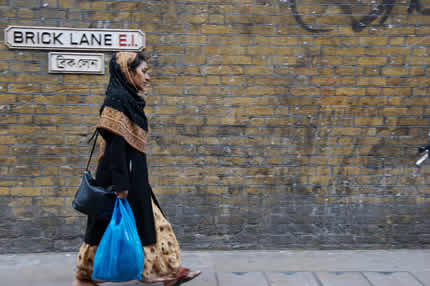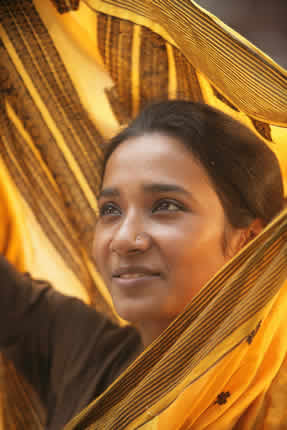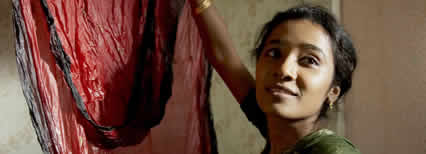 Tannishtha Chatterjee is emerging as one of India’s leading art house actresses. Her film credits include Shadows of Time (2004) directed by Oscar winning German director Florian Gallenberger and Swaraj (2002), for which she gained a National Best Supporting Actress nomination. Other award winning features which have screened globally are: Let the Wind Blow (2004), an Indo-French venture; Bas Yun Hi (2003); Strings; Divorce: Not Between Husband and Wife (2005); and Kasturi. Tannishtha’s latest principal role was in Bibar, based on the famous Bengali novel and has so far netted her the Best Actress awards at Osian’s Cinefan and the Bengal Film Journalists Association Awards, 2006.
Tannishtha Chatterjee is emerging as one of India’s leading art house actresses. Her film credits include Shadows of Time (2004) directed by Oscar winning German director Florian Gallenberger and Swaraj (2002), for which she gained a National Best Supporting Actress nomination. Other award winning features which have screened globally are: Let the Wind Blow (2004), an Indo-French venture; Bas Yun Hi (2003); Strings; Divorce: Not Between Husband and Wife (2005); and Kasturi. Tannishtha’s latest principal role was in Bibar, based on the famous Bengali novel and has so far netted her the Best Actress awards at Osian’s Cinefan and the Bengal Film Journalists Association Awards, 2006.
Tannishtha plays the part of Nazaneen in Brick Lane.
Bijan Tehrani: How were you selected for the part in “Brick Lane”?
Tannishtha Chatterjee: I was in Paris and got a call from my casting director in India saying that there was a British film (she didn’t tell me it was “Brick Lane”) and that the director and producer were coming in town and wanted to meet me. It happened to be the night I was going back to Mumbai. It was around 2 A.M in the morning and I was supposed to meet the director, Sarah Gavron, at 8 A.M that morning. I had no time to go through the email that she had sent, explaining to me about the project. I showed up to the meeting just wearing jeans and a T-shirt, and Sarah looked and me and said, ‘We are doing this film called Brick Lane’. I said, ‘Brick Lane…you mean the Monica Ali’s Brick Lane? She said ‘Yes’. I said, ‘Oh, I do not look the part at the moment’ [laughs]. So she gave me four pages to read, and I read them. She called me the next day and she said, ‘you know, Tannishtha, we really liked what you did. But we think you are a bit too young for the part. I’m not too sure you will be able to play the mother of three kids.’ But I said ‘No, no, let me come back again’. The next time I met her I tied my hair and wore a Sari and I read the part again. After a month and a half I received a call from Sarah and she said to me, ‘You were the first person we met for the role, and it was just too good to believe that the first person we found was the right person for the part. We looked for the right person all over the world, and the right person is you’. And that is how it happened.
good to believe that the first person we found was the right person for the part. We looked for the right person all over the world, and the right person is you’. And that is how it happened.
BT: That’s very interesting. Seems like another interpretation of love at first sight.
TC: [laughs]. Exactly. It’s very strange that I was the first person that Sarah and my producers met. Satish Kaushik, who plays Chanu, was the last of the Chanus that they had met. So it’s the two extremes.
BT: This is such a special part. It is such a different character than who you are, or who I guess you are. There is another dimension to this character, in that she has been living in England, which is very special. It makes a big difference in playing the part.
TC: Right. There were two aspects of the script that really excited me when I read it for the first time. For one, it was a character that is quite removed from what I really am. In India I was always known for strong female parts, but more extroverted parts. Whereas Nazneen is someone who doesn’t speak much, and is very quiet and introverted. She doesn’t even express anything; it is all going on inside of her. In a book, for a character like this, there is always a devise,  which is that you talk in soliloquies and describe what is happening inside her. How do you do this in a film? So it was a constant struggle to find ways and means to get the journey of the character right without saying or expressing anything. I think Sarah and I had a very collaborative process in working this out. The other thing that excited me about the script, like you mentioned, was that it is an experience that I have never been through. It is a very special immigrant experience where this girl who is so young comes from a small village, and is transported to what seems like an alien atmosphere where she doesn’t connect with anyone. She is married off to a man who is twenty-five years older than her. She doesn’t speak the language there, and she doesn’t have friends. The only sort of communication she has is through letters with her sister, and images that she keeps thinking about from her childhood in Bangladesh. It is a very claustrophobic life. I did go to England a month and a half before we started filming, and I met a lot of Bangladeshi women in Brick Lane, who had very similar experiences. I met them at the time when they were in their late thirties and mid forties. If you see them now they are very confident women who are living their lives the way they want to. But the stories they told me were very similar to the story of this film. When they came to England twenty years back they were sixteen or seventeen years old, and were married off to a man whom they had never met before. The husbands always had a life outside of the marriage. They were so scared of the unknown and the outside world in that particular city, and so they never went out of their flat for a year. There was one woman who told me that when she came to England she was seventeen years old, and was so scared of anything outside. She wouldn’t talk to anyone in the neighborhood and wouldn’t go out, so she was tied to her flat all day for years. So much so that the local vegetable seller, who was white, would drop her vegetables outside of her doorstep and she would just drop him the money from her window. She was scared of just taking the vegetables from him. But twenty years later that man goes to her flat and talks with her, and they have tea. So that is the kind of journey these women go through.
which is that you talk in soliloquies and describe what is happening inside her. How do you do this in a film? So it was a constant struggle to find ways and means to get the journey of the character right without saying or expressing anything. I think Sarah and I had a very collaborative process in working this out. The other thing that excited me about the script, like you mentioned, was that it is an experience that I have never been through. It is a very special immigrant experience where this girl who is so young comes from a small village, and is transported to what seems like an alien atmosphere where she doesn’t connect with anyone. She is married off to a man who is twenty-five years older than her. She doesn’t speak the language there, and she doesn’t have friends. The only sort of communication she has is through letters with her sister, and images that she keeps thinking about from her childhood in Bangladesh. It is a very claustrophobic life. I did go to England a month and a half before we started filming, and I met a lot of Bangladeshi women in Brick Lane, who had very similar experiences. I met them at the time when they were in their late thirties and mid forties. If you see them now they are very confident women who are living their lives the way they want to. But the stories they told me were very similar to the story of this film. When they came to England twenty years back they were sixteen or seventeen years old, and were married off to a man whom they had never met before. The husbands always had a life outside of the marriage. They were so scared of the unknown and the outside world in that particular city, and so they never went out of their flat for a year. There was one woman who told me that when she came to England she was seventeen years old, and was so scared of anything outside. She wouldn’t talk to anyone in the neighborhood and wouldn’t go out, so she was tied to her flat all day for years. So much so that the local vegetable seller, who was white, would drop her vegetables outside of her doorstep and she would just drop him the money from her window. She was scared of just taking the vegetables from him. But twenty years later that man goes to her flat and talks with her, and they have tea. So that is the kind of journey these women go through.
BT: That is amazing. It is such a journey to play this part.
TC: Yea, I enjoyed it thoroughly. Actually when I read the novel I was a bit surprised. Honestly I didn’t believe certain things. I felt, ‘my god, someone who has been living in England for so long, how can it be true?’ What happens is that the immigrant experience makes you hold on to your traditions in a much stronger way than you do in your own country. Because I was born and raised in India, and am comfortable with the changes that my society has gone through, I do not hold onto things as much as an immigrant would. When I came to England to do this research – in my past visits I always hung out with people who are like me, I never knew this was another world that existed – I was quite surprised to meet women who had stories like Nazneen.
BT: How did you find working with the other actors in this film?
TC: Sarah tested so many people for Chanu. After I was chosen for my role, a lot of the possible Chanus were testing with me to see what the chemistry was like. One day Sarah called me and asked if I knew an actor called Satish Kaushik. I knew that he was a very successful director in Bollywood films. But I saw a play two or three years back, and he was playing Willie Loman in “Death of a Salesman”, and I thought ‘Oh my god! That is Chanu’ [laughs]. And so they flew down to Deli to meet him, and we did a couple of scenes together. Satish is from the same institute that I came from, the National School of Drama. We had an instant connection, having the same teachers. It was great working with him. He is a very fun person, and very funny and entertaining in real life. Christopher [Christopher Simpson, who plays Karim] had a very tough part. He is half Irish, and his mother is half Rwandan and half Greek. He is not even Asian. To be able to transform himself into that part – and he just had one week’s time to do it, because it was a very last minute call – I think he did an incredible job. I am very good friends with both of my co actors, and we still remain in touch. I had a great time working with them. It was also great fun playing with the two girls who play my daughters. We had a very great experience working together.
Kaushik. I knew that he was a very successful director in Bollywood films. But I saw a play two or three years back, and he was playing Willie Loman in “Death of a Salesman”, and I thought ‘Oh my god! That is Chanu’ [laughs]. And so they flew down to Deli to meet him, and we did a couple of scenes together. Satish is from the same institute that I came from, the National School of Drama. We had an instant connection, having the same teachers. It was great working with him. He is a very fun person, and very funny and entertaining in real life. Christopher [Christopher Simpson, who plays Karim] had a very tough part. He is half Irish, and his mother is half Rwandan and half Greek. He is not even Asian. To be able to transform himself into that part – and he just had one week’s time to do it, because it was a very last minute call – I think he did an incredible job. I am very good friends with both of my co actors, and we still remain in touch. I had a great time working with them. It was also great fun playing with the two girls who play my daughters. We had a very great experience working together.

